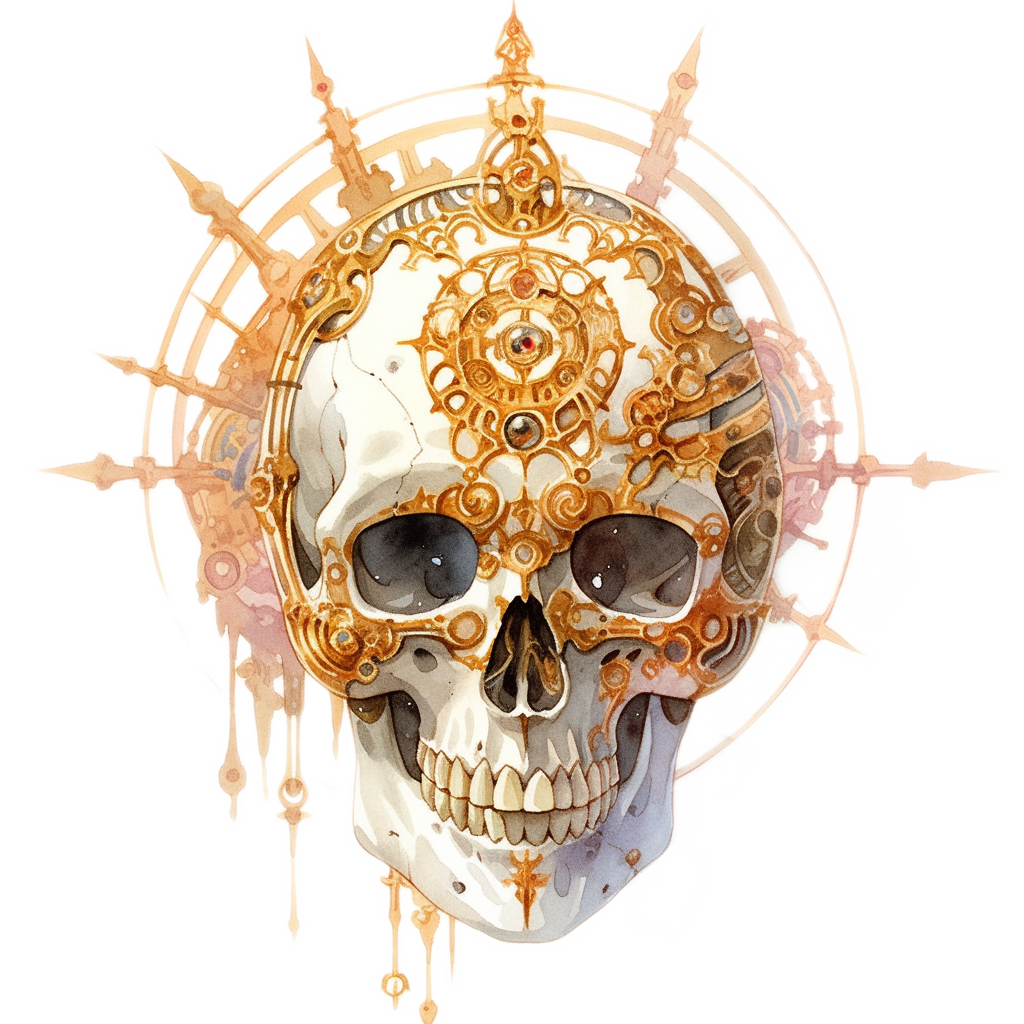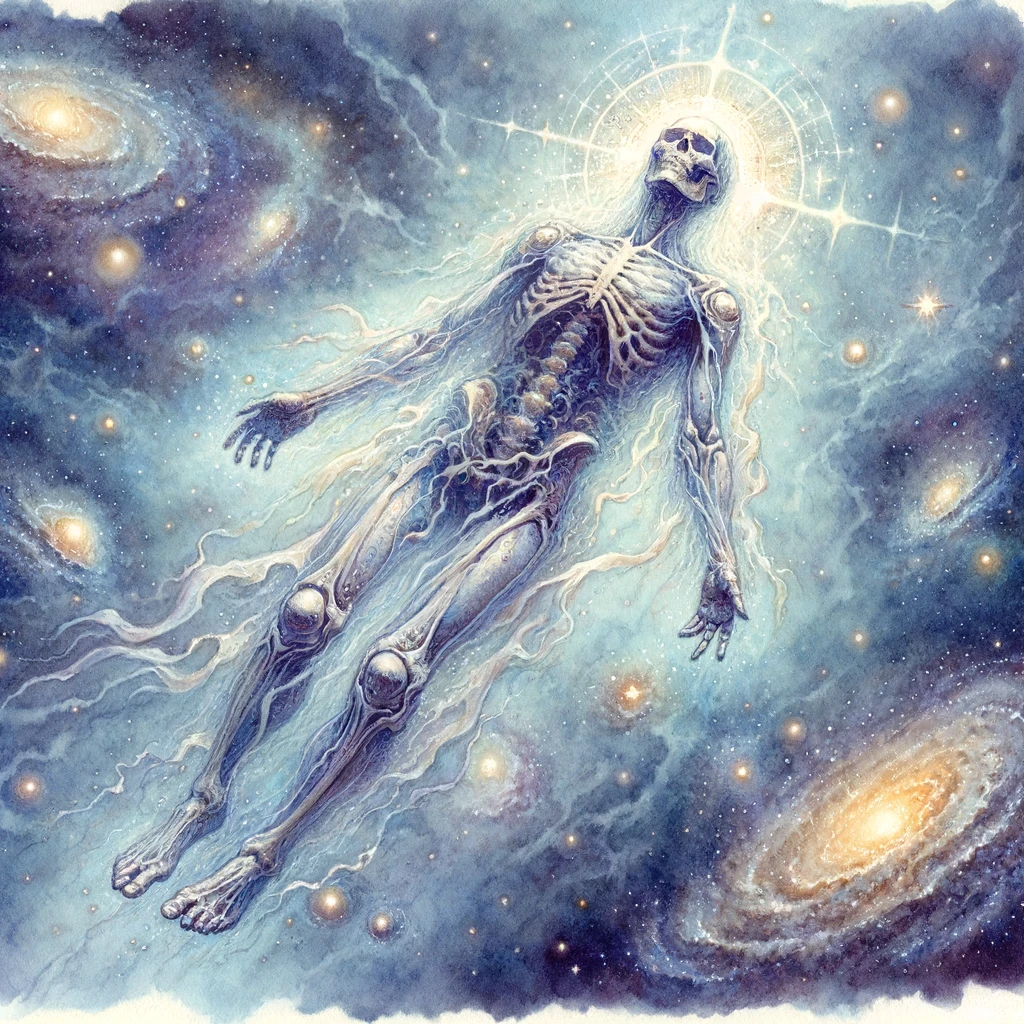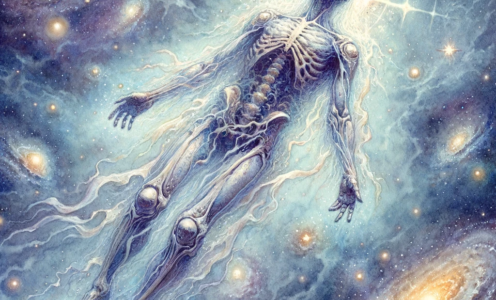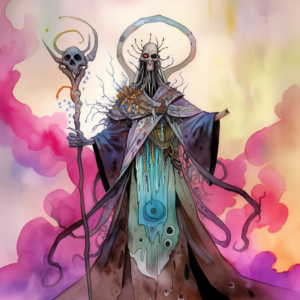The Athar Guide to Dead Powers
by Burbank and Corsica Ralopolis
The good old Dead Book, that dusty tome where we all go when we’ve kicked the proverbial bucket. But wait; it’s not just us mere mortals that can be written into the dead book, oh no. The so-called Immortals can die as well. Now hold on to your bub cutter, because this is where their lies start to unravel. Let’s wag our bone-boxes ’bout these once-mighty powers who’ve taken the last carriage to the Astral. It’s a bit of a giggle, isn’t it? Gods, those lofty beings of immense power, snuffed out like a candle at a drunkard’s wake. It’s almost enough to make you think that perhaps ‘gods’ aren’t really so special after all, eh cutter?
First on the roll call is Myrkul, one of the Dead Three from the prime world they call Toril. Old Myrkul, the Lord of Bones, used to be the god of the dead before he got a nasty taste of his own medicine. There’s nothing like a god of death finding out what it’s like on the other side. Deliciously ironic, don’t you think? Like a lifeguard drowning in his own bath. Not just ironic, also good for recruitment to our faction, oh yes. Doubter Xashion herself was once a follower of lord bone head.
Then there’s Bhaal, another of the Dead Three. This basher staked his reputationon murder and death, but apparently, he didn’t see his own backstabbing coming. Goes to show, if even a god of murder can get a surprise party with a dagger as the parting gift, then what’s the point of being a god in the first place?
And we can’t forget Aoskar, the god of portals, who fell afoul of the Lady of Pain herself. A god of doors and gateways being shown the door—you can’t write comedy like that. Seems the Lady didn’t like anyone muscling in on her turf, especially not some berk who thought he way the keymaster of the multiverse.
And how about Leira, the goddess of deception? She got done in, and now nobody’s quite sure if she’s really dead or just playing the longest con in history. It’s all very mysterious, which is probably just how she’d like it. The goddess of illusions fooling us with the biggest fib of all: her own demise.
Now take Baldr of the Norse. This berk was the darling of Asgard, loved by all—well, almost all. He was so beloved that his mother, Frigg, made every thing in the world swear not to harm him. But, as always, there was a loophole. Mistletoe, that unassuming plant, was overlooked. Enter Loki, the ever-unhelpful trickster, who nonchalantly hands a mistletoe dart to Baldr’s blind brother, Hodr. Next thing you know, the most beloved god in Asgard is taking a permanent nap in the Astral. A so-called god taken down by a sprig of greenery—you can’t make this stuff up.
Then there’s Osiris of the Egyptian pantheon, now his tale is a real family drama. His brother Set, green with envy, decides to play the world’s worst party game: He tricked Osiris into lying in a coffin, seals it shut, and chucks it into a river. And then just to make sure Set tore Osiris up into fourteen tiny pieces and hid them all across the planes. Fortunately for Osiris, his wife Isis was eventually able to gather up the bits, restoring him and inventing mummification at the same time. Osiris ended up ruling the Underworld, which is probably still a bit of a downgrade when you’re used to being top cutter of the the living world.
And don’t forget about Quetzalcoatl, one of the major gods of the Aztec pantheon. He’s a creator god, a feathered serpent, a bringer of knowledge. But even he met a tragic end, tricked by another god, Tezcatlipoca, and ends up setting himself on fire and turning into the morning star. It’s like a tragic opera, but with feathers and immolation.
And of course there’s *****. The Prince of the Undead himself. Well, ain’t he a charmer? Picture the very life of the party, if the party was in a crypt and everyone was dead. This cutter is all about undeath and decay, a real connoisseur of the rotting and the ruined. He wanders around the Abyss, which is like the worst part of the Hive you can imagine, only with lava and more screaming. Now ***** has a bit of an obsession with souls and power, like a collector who can’t stop at just one haunted artifact. He’s been around the block a few times, fallen out with most of the other demon lords, put in the dead book and chant goes he’s still just about kicking—or at least floating menacingly in the Astral. So, if you find yourself bumping into a tall, horned figure with a penchant for the necrotic arts, well, you’ve probably met *****.
Then there’s the story of Dionysus from Greek mythology. He’s the god of wine and a good time, but he has a bit of a rough start, although this story sounds like it was written under the influence. Dionysus got himself torn to shreds as a youngster by Titans, only to be rescured and reborn from his father Zeus’ thigh. That’s right, his thigh. If that doesn’t put a spin on the concept of “being born again,” I don’t know what does.
Now let’s take the tale of Izanami and Izanagi from Japanese mythology. This divine couple, they’re like the original power pair. They got busy creating islands and gods, but then Izanami dies giving birth to the concept of Fire (talk about an occupational hazard). Izanagi, missing his wife something fierce, treks down to Yomi, the land of the dead. But Izanami’s looking decidedly worse for wear, which terrifies him, and when she chases him back to the land of the living, it’s like a scene from a horror show. So, she doesn’t exactly come back to life, but neither did she stay dead. With the powers, as usual, things are messy and complicated.
Then finally there’s Vecna, the arch-lich and deity of evil secrets. This old bone-rattler was supposedly destroyed, but as anyone in the planes will tell ya, Vecna’s as hard to get rid of as a case of the Abyssal Itch. Now I’m not counting but chant goes he’s made a couple of comebacks, each time getting more scheming and malevolent than the last. Vecna’s like that one uncle who always ruins family gatherings, only with more necromancy and trans-planar-domination.
So, what’s the deal with powers who die, and especially with those who come back again? Well, these stories often apparently symbolize things like renewal, the changing of the seasons, or the cycle of life and death. Or maybe these beings just can’t stand to be out of the spotlight for too long. Whatever the reason, it’s a good reminder that in the realms of the so-divine, “dead and gone” is more like “dead and back again at some point in the future”.
See Also: The Athar Guide to the Powers



